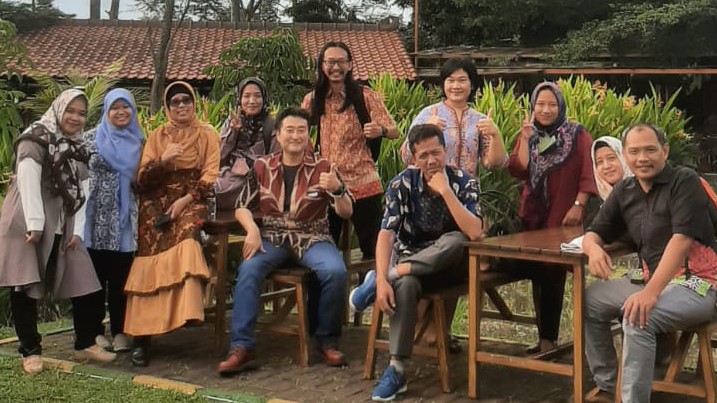The Study Programme of Japanese Literature Lecturers of Universitas Brawijaya Preparing Collaborative Class for The Upcoming Even Semester 2022/2023
Author: Anthony Filippo Osvaldo Limar
Editor: Yohanes Padmo Adi Nugroho
The Study Programme of Japanese Literature, Faculty of Cultural Studies, Universitas Brawijaya, held a Workshop on Preparing Collaborative Class Course modules. The workshop was held at Nendes Kombet Café, Karang Ploso, Malang Regency, on Thursday, February 2, 2023, from 9.00 until 15.30 WIB (Western Indonesian Time). The study programme, invited two speakers, Dr. Putu Dian Danayanti Degeng, S.S, M.Pd. and Dr. Ive Emaliana, S.Pd, M.Pd., to assist the lecturers in preparing the collaborative class course modules. This workshop was attended by the team teaching members of the Study Programme of Japanese Literature at Universitas Brawijaya.
Dr. Putu Dian Danayanti Degeng, S.S, M.Pd., English Language and Education lecturer at FCS UB, known as Mrs. Anya, delivered the first material about “Explanation on Constructing Course Module and Collaborative Class.” She explained the meaning of Collaborative Class as a class focusing more on teaching where the lecturer acts more as an observer and problem solver. Lecturers are no longer seen as omniscient figures but as moderators who invite students to observe, understand, and try to solve problems or cases. Mrs. Anya also stated there are three learning models: Problem-Based, Case-Based, and Project Based.
Case-based is a learning model where lecturers provide the students with theories and materials to face and solve problems. Meanwhile, Problem-Based is how the lecturers provide concrete issues in society so that the students try to immediately identify the problem and provide a solution to be discussed. In Problem-Based, the lecturers give the material and theory after identifying the problem.
In the Project-based learning model, students are first provided with material and theory. Ultimately, the students must create an output in the form of goods or services that the public can use. The exciting part is that Project-based can be used as a substitute for the final examination.
Mrs. Anya hoped that lecturers could provide learning options for students. This is important to stimulate students in order to be active in learning activities. For example, if the students enjoy writing, writing articles is the best assignment for them. If they like talking, the task could be creating a video to be uploaded on social media. These two examples can be used as indicators of student’s learning achievement.
After Mrs. Anya’s presentation, the following session talked about the experiences and reviewed the course modules by Dr. Ive Emaliana, S.Pd, M.Pd., commonly known as Mrs. Ive, the English Language and Education lecturer at FCS UB. In this workshop, the Study Programme of Japanese Literature lecturers were divided into several teaching teams according to the courses taught. The lecturers were given the opportunity to explain the results of course modules and then got constructive feedback from Mrs. Ive.
Mrs. Ive also emphasized the importance of self-evaluation at the end of the learning process. If many students get low grades in a course, the lecturer is encouraged to self-evaluate their teaching methods. Conversely, if many students receive high grades, it prompts questioning whether the course instruction could have been more challenging.
Collaborative Class encourages both lecturers and students to constantly study the theories, themes, and materials of the courses. Apart from that, this model urges lecturers and students always to be grounded in the theories, themes, and course materials so that students can find the correlation with the everyday reality of concrete society life. It is hoped that Collaborative Classes can keep the knowledge updated, and students are encouraged to become active learners and always have heutagogical perspectives (self-directed learners).
